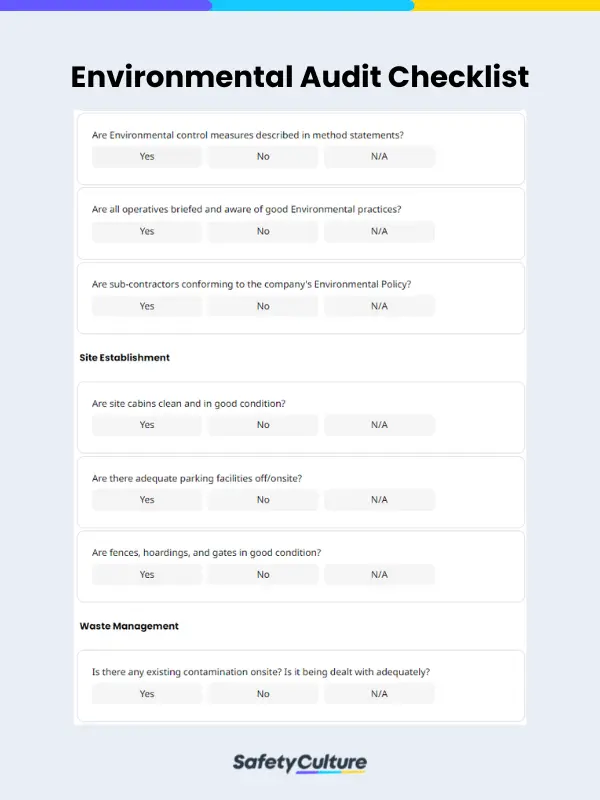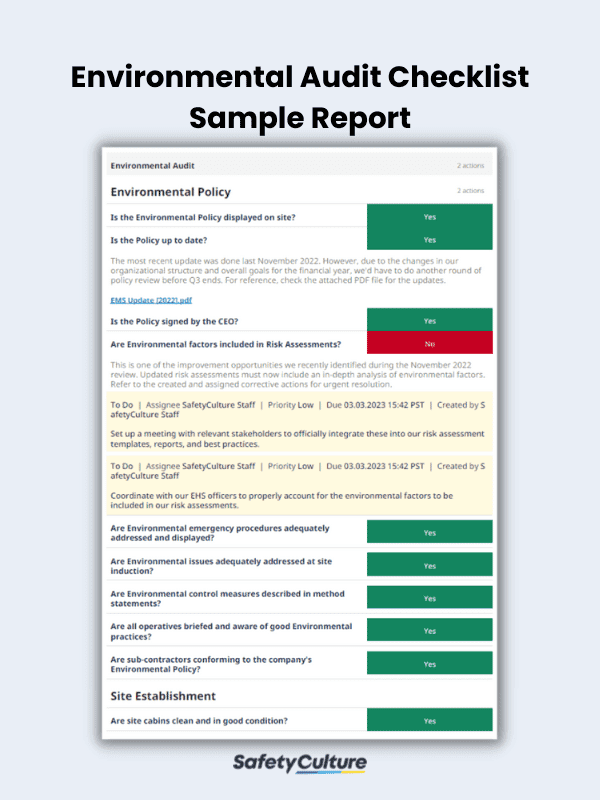What is an Environmental Audit Checklist?
An environmental audit checklist is a useful tool for assessing the environmental impact of an organization’s business processes. It can be used to identify areas of improvement and ensure that the organization is meeting all of its environmental obligations. Businesses, government agencies, and non-profit organizations can all benefit from using an environmental audit checklist.
Who Can Use This Checklist?
Apart from businesses, environmental audit checklists are also beneficial for individuals and educational institutions (e.g., schools and universities) looking to reduce their environmental impact. By using a checklist for environmental audit processes, they can ensure they’re meeting the minimum environmental obligations and regulatory compliance. They can also use a checklist to identify areas where they can make changes to reduce their environmental footprint. This could include reducing energy consumption, water usage, or waste.
Benefits
An environmental audit checklist can provide a number of benefits to businesses and organizations. One is that they can maximize this tool when determining potential environmental risks and providing guidance on how to reduce or eliminate them. It’s also a key compliance tool that aids in providing a framework for developing and implementing environmental policies.
Additionally, an environmental audit checklist can help pinpoint areas of potential cost savings, such as reducing energy consumption or improving waste management practices. By taking the time to review and implement this checklist, businesses and organizations can ensure they are taking the necessary steps to protect the environment and reduce the impact they’re making that can potentially harm it.
What is Included in an Environmental Audit Checklist?
In most cases, an environmental audit checklist must have the following elements, and sections to account for the most important details:
- Title Page – contains the audit date, location, and facilitator
- Environmental Audit – allows you to answer Yes-No-N/A questions regarding the organization’s environmental policy, control measures, waste management practices, and other related aspects
- Completion and Sign-Off – lets you state additional comments and include digital signatures before exporting the completed template into a report
How to Use One
The first step in using an environmental audit checklist is to identify the areas of your business that need to be audited. Once you have identified these, you can create a checklist that outlines the specific tasks that need to be completed to ensure compliance with environmental regulations.
The next step is to conduct the audit. This involves gathering data and information on energy use, waste management, and water use. Once the data has been collected, an analysis must follow to identify any areas of non-compliance.
Finally, the results of the audit should be documented and reported. This should include any areas of non-compliance identified during the audit. The report should also include recommendations for corrective actions. Lastly, the report should be shared with relevant stakeholders and properly documented for future reference.
FAQs About Environmental Audit Checklists
Environmental auditors, in most cases, are the ones responsible for preparing the report once audits are completed. They are the dedicated personnel tasked to ensure that standardized procedures are followed.
In the United States, the Environmental Protection Agency (EPA) is the regulatory body that sets forth guidelines for safe tolerance levels for chemicals and other pollutants in food, animal feed, and water. An EPA report is a key document used by inspectors when assessing an organization’s compliance with environmental laws.
There are several different types of environmental audit checklists that can be used, depending on the needs of the organization.
The most common is a compliance audit. This type is used to ensure that the organization is in compliance with all applicable environmental regulations. It includes items such as waste management, air emissions, water quality, and hazardous materials management. The checklist also has items related to the organization’s Environmental Management System (EMS), such as training and documentation.
Another type is a sustainability audit. This is used to assess the organization’s environmental performance in terms of sustainability. It includes items such as energy efficiency, water conservation, waste reduction, and an organization’s sustainability initiatives, such as green building practices and renewable energy sources.
One of the main risks is that the checklist may not be comprehensive enough to identify all potential environmental risks. Also, if it isn’t properly implemented, it may not be effective in addressing them and can lead to inaccurate results and conclusions.
Another risk associated with an environmental audit checklist is that it may not be updated regularly. As environmental regulations and standards change, the checklist should reflect these changes.




